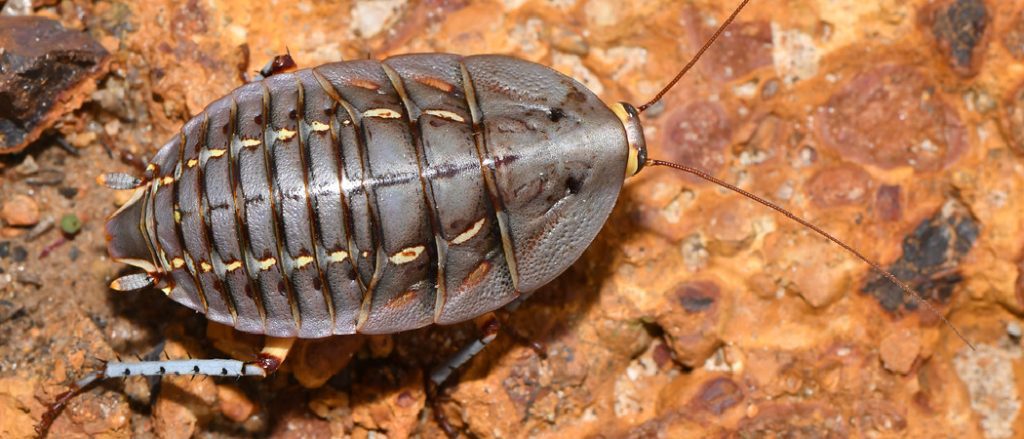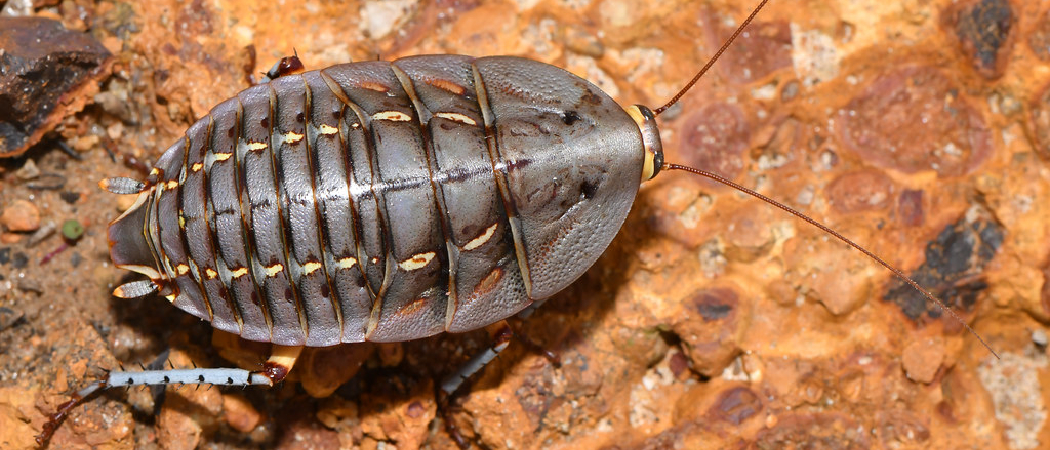Dubia roaches eat a wide variety of organic matter, including fruits, vegetables, grains, and decaying plants. As omnivores, they also consume protein sources such as insect larvae, eggs, and dead animals.

These roaches are especially fond of high-moisture foods and can benefit from a diet supplemented with commercial roach chow. Their scavenging nature enables them to thrive on a diverse assortment of food, even benefiting from items like cardboard and paper as a source of cellulose.
By ensuring a well-balanced and nutrient-rich diet, owners can maintain healthy Dubia roach colonies for their reptile and amphibian pets, and also provide a cost-effective way to breed feeder insects.
Natural Diet Of Dubia Roaches
Understanding the natural diet of Dubia roaches is crucial for keeping them healthy and thriving. These roaches belong to the Blattodea order and are omnivorous, meaning they consume a diverse range of food items for their nutrition. Having a balanced diet replicating their wild diet is essential for their well-being in captivity.
Variety Of Fruits And Vegetables
Dubia roaches thrive on a diet that includes a variety of fruits and vegetables. These items not only provide essential vitamins and minerals but also introduce dietary diversity. Here is a list of fruits and vegetables that you can add to their diet:
- Leafy greens: such as kale, spinach, and collard greens
- Squash: like zucchini and butternut squash
- Root vegetables: including carrots and sweet potatoes
- Fruits: such as apples, oranges, and bananas
- Berries: like blueberries and strawberries
It’s important to note that while these roaches consume fruits and vegetables, they should not be their main food source. A balanced diet also includes protein-rich foods.
Protein-rich Foods
Dubia roaches require protein to support their growth and overall health. In the wild, they obtain this protein from various sources, including decaying organic matter. To mimic their natural diet, you can provide the following protein-rich foods:
- High-quality insect chow
- Pelleted chicken feed
- Fish flakes
- Boiled eggs or eggshells
- Mealworms or crickets (as occasional treats)
Offering a combination of these protein sources ensures that your Dubia roaches receive the necessary nutrients. Remember to provide a small amount and remove any uneaten food within 24 hours to maintain cleanliness in their enclosure.

Credit: www.amazon.com
Feeding Dubia Roaches In Captivity
Commercial Roach Diets
One of the easiest and most convenient ways to feed Dubia roaches in captivity is through the use of commercial roach diets. These specially formulated diets are designed to provide all the necessary nutrients for the roaches’ growth and development. Commercial roach diets come in either pellet or powdered form and can be easily purchased from pet stores or online retailers. They are typically made with a combination of proteins, grains, vitamins, and minerals, ensuring that your Dubia roaches receive a balanced diet.
Supplementing With Fresh Foods
Dubia roaches also benefit from a variety of fresh foods as part of their diet. These can include fruits, vegetables, and leafy greens. Fresh foods not only provide additional nutrients but also help to keep the roaches hydrated. Some popular choices for fresh foods include apples, carrots, squash, and kale. It is important to remember that fresh foods should be chopped or cut into small pieces to make it easier for the roaches to consume.
When it comes to feeding fresh foods to Dubia roaches, moderation is key. While a variety of fresh foods is beneficial, too much of a good thing can be harmful. Overfeeding fresh foods can lead to increased moisture levels in the enclosure, which can create a breeding ground for bacteria and mold. A general rule of thumb is to offer fresh foods about once or twice a week, in addition to their regular diet of commercial roach diets.
It is important to note that not all fresh foods are safe for Dubia roaches. Some foods, such as citrus fruits, avocado, and onions, should be avoided as they can be toxic or harmful to the roaches. Always research and make sure the fresh foods you offer are safe for Dubia roaches.
By combining a commercial roach diet with fresh food supplementation, you can ensure that your Dubia roaches receive a nutritious and balanced diet while in captivity.
Tips For Feeding Dubia Roaches
Dubia roaches are an excellent choice for those who keep insect-eating pets or as part of a feeder insect breeding program. These roaches have gained popularity due to their high nutritional value and ease of breeding. However, to ensure the health and well-being of Dubia roaches, it is essential to provide them with a proper feeding schedule, appropriate housing, and a reliable water source. In this article, we will explore some valuable tips for feeding Dubia roaches to help you maintain a thriving colony.
Proper Housing To Encourage Feeding
Creating the right environment for Dubia roaches is crucial to encourage feeding. Here are some key factors to consider when setting up the housing:
- Temperature and Humidity: Maintaining a temperature between 80-95°F (27-35°C) and humidity levels between 40-60% is crucial for their overall well-being. These conditions mimic their natural habitat and promote their feeding and breeding behaviors.
- Dark and Secure Hiding Spots: Providing Dubia roaches with ample hiding spots, such as egg cartons or cardboard tubes, helps reduce stress and create a sense of security. Roaches are nocturnal creatures and prefer dark environments to feel safe and thrive.
- Well-Ventilated Enclosure: Ensuring proper ventilation is vital to prevent the buildup of ammonia and maintain good airflow within the enclosure. This helps keep the roaches healthy and active, promoting regular feeding habits.
Feeding Schedule And Quantity
Dubia roaches are opportunistic feeders and will consume a variety of organic matter. By following a consistent feeding schedule and providing them with an appropriate quantity of nutritious food, you can ensure their well-being and promote healthy growth. Here are some guidelines to consider:
- Feeding Frequency: Offering food to Dubia roaches once every 24-48 hours is recommended. This interval allows them to consume the provided food before it spoils, reducing food waste and preventing potential contamination.
- Quality Protein-Rich Food: Dubia roaches require a diet high in protein to thrive. You can provide a variety of protein-rich foods such as high-quality dry dog food, fresh fruits and vegetables, and commercially available roach chow. Fresh and diverse food options keep the roaches interested and ensure their nutritional needs are met.
- Feeding Quantity: A general rule of thumb is to offer an amount of food that the roaches can consume within 24 hours. Overfeeding can lead to excess waste, poor hygiene, and the growth of mold or bacteria, while underfeeding may starve the colony and negatively impact breeding and growth rates.
Water Source
A reliable water source is essential for the overall health, hydration, and digestion of Dubia roaches. Here’s how you can ensure an adequate water supply:
- Water Gel: Providing water gel or water crystals in a shallow dish can help maintain consistent hydration. These gels are easy to use and prevent drowning accidents, ensuring constant access to clean drinking water.
- Fruits and Vegetables: Fresh fruits and vegetables with high water content, such as oranges and cucumbers, can also serve as a source of hydration for Dubia roaches. Adding small slices or chunks of these foods to their enclosure provides both water and additional nutrients.
- Moisture Maintenance: Regularly check and replace the water source to ensure cleanliness and prevent the growth of bacteria or mold. Cleaning the water dish or refreshing the water gel every few days helps maintain a healthy living environment for the roaches.
By following these tips for feeding Dubia roaches, you can establish a proper feeding routine that promotes their overall health and ensures longevity. Remember to monitor their feeding habits, adjust quantities as needed, and always provide a varied and nutritious diet. Keeping your Dubia roaches well-fed and hydrated will result in healthier breeding colonies and thriving pets.

Credit: www.reptiles.swelluk.com

Credit: www.amazon.com
Frequently Asked Questions Of What Do Dubia Roaches Eat
What Do Dubia Roaches Eat In Captivity?
Dubia roaches eat various fruits, vegetables, grains, and proteins. They require a balanced diet consisting of leafy greens, carrots, oats, and high-quality protein sources such as dog food or fish pellets. A diverse diet ensures their nutritional needs are met and keeps them healthy.
Can Dubia Roaches Eat Citrus Fruits?
Yes, Dubia roaches can eat citrus fruits in moderation. However, it’s best to offer them other fruits like apples or bananas as the high acidity of citrus fruits can be harmful to their digestive system if given in large quantities.
How Often Should I Feed Dubia Roaches?
Dubia roaches should be fed daily to maintain their nutritional balance. However, it’s essential to monitor their feeding habits closely and adjust the amount of food offered based on their consumption. This ensures they have enough to eat without wasting excess food.
What Happens If Dubia Roaches Do Not Get Enough Calcium?
A lack of calcium can lead to serious health issues in Dubia roaches. It may result in weak exoskeletons, difficulty molting, and ultimately death. To prevent this, provide calcium-rich food sources like cuttlebone or calcium supplement powder to ensure their calcium requirements are met.
Conclusion
To sum up, understanding the dietary needs of Dubia roaches is crucial for their optimal health and breeding. By offering a nutritious and balanced diet consisting of fresh fruits, vegetables, and high-quality protein sources, you can ensure the well-being of your Dubia roach colony.
Remember to provide them with ample moisture, avoid feeding them toxic foods, and regularly monitor their consumption. Taking these simple steps will help you maintain a thriving Dubia roach population for your reptiles or as a source of nutritious feeders.


